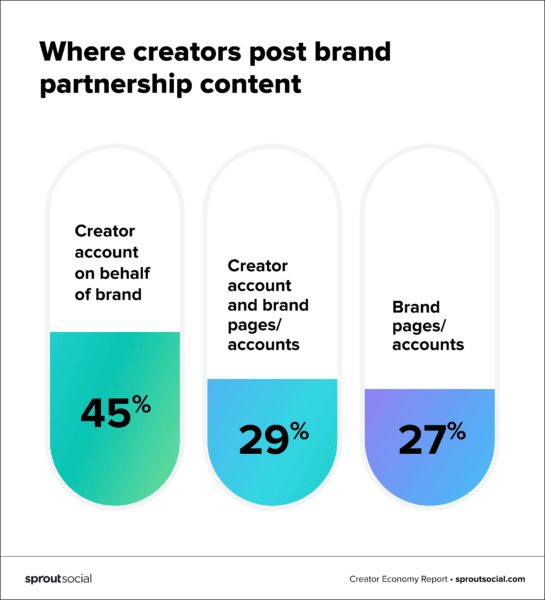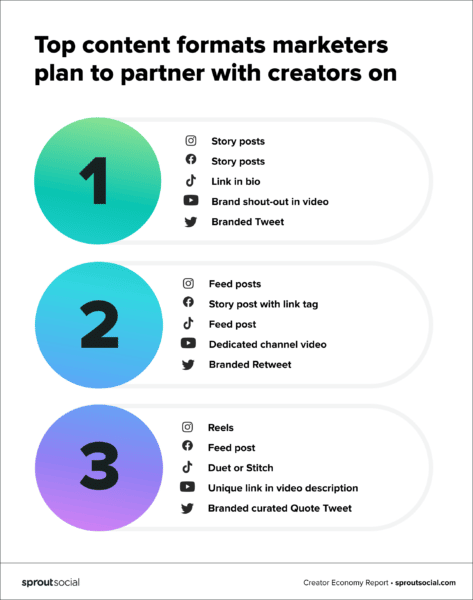There are about 50 million people that identify as creators and the opportunities for them to monetize their content and form brand partnerships are endless. Let’s take a look at some of the changes some social media platforms have made in the last 2 months alone.
- YouTube partners with Shopify to deliver shopping tools for brands, creators
- Instagram announces payments in chat
- Instagram subscriptions test adds 3 new features
- Pinterest Shopping adds 4 new features
- Twitter launches Branded Likes
- Twitter testing long-form Notes
- Meta launches new monetization tools
- Pinterest launches idea ads and paid partner tools
- New shopping links for Google AdSense
- 5 new tools for LinkedIn creators to get more followers, visibility
Marketers are on board. With all of these opportunities, it’s no wonder why 74% of marketers are planning to spend at least a quarter of their social media budgets on content creator partnerships over the next 3-6 months. Though, with recession fears looming, budget and lack of resources are two roadblocks many of those brands are facing.
Brands are concerned with more than just revenue. For brands interested in working with content creators, Sprout Social reports that 62% prioritize generating more audience engagement. 60% want to reach new audiences. And surprisingly, only 42% prioritize generating additional revenue. 53% of marketers want to strengthen their social community and 41% are looking to promote their brands’ values by relying on creators. Sprout Social also reports authenticity ranks as the second most important creator qualification.

Case study: GoPro. GoPro drove huge success by working with a diverse group of creators from pro athletes to mommy bloggers. In 2015, GoPro’s senior director/lifestyle marketing Todd Ballard discussed their success at a conference in Chicago.
Ballard argued that the brand’s “family of ambassadors” has a crucial role in consistently delivering the type of aspirational, inspirational material which encourages consumers to buy its devices.
“What’s really made GoPro successful to date is finding those taste-makers and those influencers within each market and in specific niches,” he said. “It’s kind of the inside-out marketing of start with the influencers and let them influence the masses.”
As a result, GoPro generated 4234 million in 2011 and by 2012, revenue had doubled to $526 million, and in 2013, $985 million. By 2017 it had over 3 million YouTube followers and was YouTube’s top brand channel.
Where are marketers and creators promoting. Marketers expect to use Instagram (58%), followed by Facebook (51%) and TikTok (50%) for creator collaborations in the next 3-6 months. While these platforms also top the list for usage among consumers, more than half are planning to spend more time on YouTube, yet only 27% of marketers are putting money into creator collaborations on the platform.
According to Sprout Social, 45% of brands have the creators post on their own accounts, and only 27% post on the brand’s pages. Content posted on a creator’s account gives the promotion more of an organic feel and has the potential to expand the brand’s reach.

What are creators posting. Educational content takes the top spot according to Sprout Social. Brands are looking for creators to create authenticity and to show consumers how to use their product or service. Potential customers want to know what to expect after they purchase a product or service, and organic education content delivers.
Unboxing and reveal content also top the list in popularity and are great ways to share the brand experience.
Testimonials, giveaways or challenges, and behind-the-scenes are other content forms that creators can use to grow their following and promote brands.

Feeds and stories and posts. Oh my. Instagram and Facebook still dominate when it comes to where you post. But as far as the type of format, story posts are where it’s at.

Finding the right creators. Finding the right creators to promote your brand can be tedious. But if you have some basic benchmarks of reach and follower count, the process is a little easier. According to Glewee, a platform that connects creators and brands, the following are the minimum thresholds to look for when recruiting creators.

Start your creator program. 40% of companies with 5,000 employees or more involve their legal team when sourcing creators. If your business falls in that category, be sure you’re managing contractual considerations properly. Sprout Social reports that as far as timeline, A one-to-two week time frame is standard for 49% of marketers, and 27% take three-to-four weeks. Moving quickly is preferred, especially if your promotions are time-sensitive. You also want to ensure an easy, seamless, and professional process to help the creator feel like your brand is organized and legitimate.
Why we care. It’s 2022 and with all of the new platforms and features being launched, creators have the upper hand. If your brand has the budget and can benefit from organic marketing campaigns with an authentic voice, utilizing creators could help your brand gain followers, trust and engagement.
If you’re a creator looking to monetize your content, promoting brands is a great way to do just that. If you have a large social media following, utilize one of several tools, platforms, and features to help you find brand partnerships.
The post Marketers take notice – the creator economy is booming appeared first on Search Engine Land.


